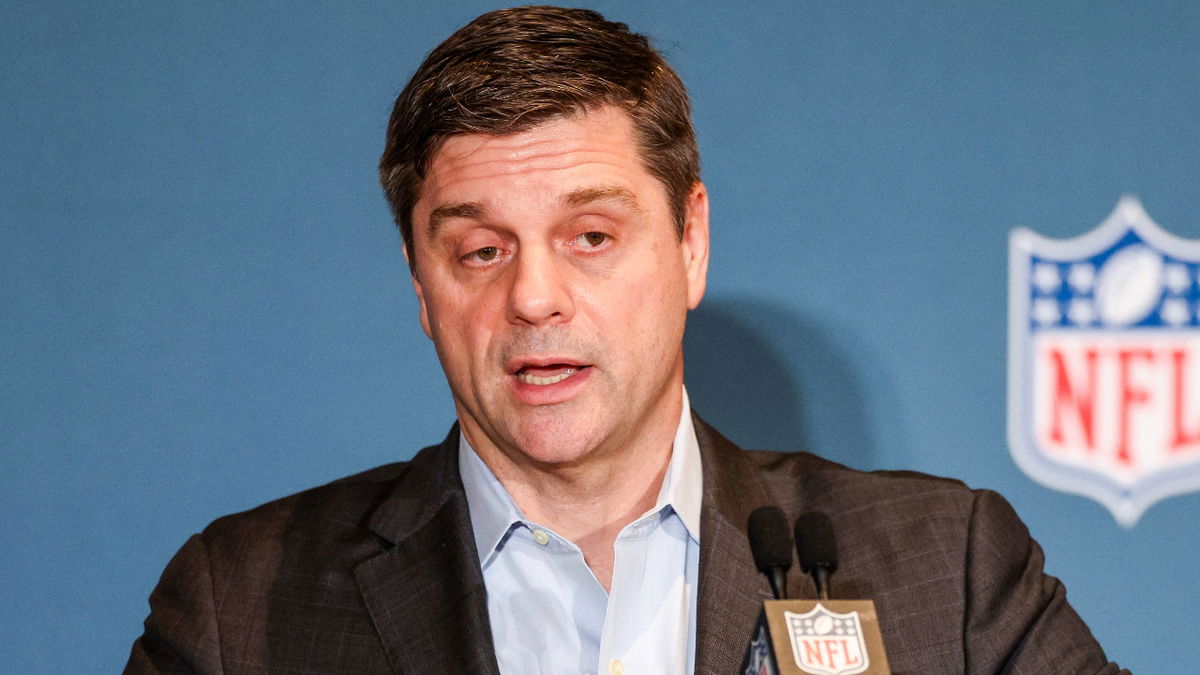
Imago
Brian Rolapp, new CEO of PGA Tour

Imago
Brian Rolapp, new CEO of PGA Tour
When your stock nosedives and investor confidence collapses, you don’t stick with internal promotions, you bring in a disruptor. That’s exactly what the PGA Tour did by hiring Brian Rolapp, a powerhouse executive who spent over two decades turning the NFL into a commercial behemoth. Rolapp leaving his NFL stronghold—where he masterminded deals worth over $100 billion—to lead golf might sound risky. But not when you consider the Tour’s trajectory under Jay Monahan: collapsing player trust, plummeting sponsorship deals, and a floundering LIV Golf merger that even White House intermediaries couldn’t save. In crisis mode, the PGA Tour bet everything on a proven rainmaker. But, it’s only natural to wonder: why him?
Watch What’s Trending Now!
Brian Rolapp brings the PGA Tour the billion-dollar solution
Rolapp redefined modern sports economics with the NFL, engineering $113 billion in media rights deals between 2011 and 2021—a staggering 75% growth over the league’s prior haul (CNBC). These weren’t just big numbers; they were strategic plays that locked in multi-platform deals during the streaming revolution. Under his leadership:
Disney/ESPN committed $2.7 billion annually for Monday Night Football.
NBC/Comcast signed on for $2 billion, securing Sunday Night Football’s prominence.
Amazon made history by acquiring exclusive rights to Thursday Night Football for $1 billion/year, marking the NFL’s first all-digital broadcast partnership
Rolapp didn’t just maximize value, he redefined reach. His focus on digital transformation and younger demographics is directly applicable to golf, where viewership has skewed older and less tech-savvy. The PGA Tour has been struggling to resonate with millennials and Gen Z, a challenge Rolapp is uniquely equipped to address through integrated digital strategies.
Business acumen also runs in the family. Rolapp’s father, Duane Rolapp, helped broker the PGA Tour’s first-ever TV deal in the 1960s, laying the foundation for televised golf. Now, his son returns with Harvard Business School credentials and NFL-tested strategies, offering the Tour more than just a fresh face, he brings a roadmap to compete in today’s hyper-commercialized sports landscape. Yes, there still are doubts around his hiring, but Tiger Woods endorsement does help put some of them to rest.
Brian Rolapp has been announced as the new CEO of the PGA Tour.
Jay Monahan will transition his day-to-day responsibilities to Rolapp and is stepping down from his role at the end of 2026. pic.twitter.com/Qc5g1vwzoy
— Golf Digest (@GolfDigest) June 17, 2025
Crucially, Tiger Woods personally backed Rolapp’s hiring from his influential seat on the PGA Tour’s Policy Board. That endorsement wasn’t symbolic. It was strategic cover, helping win over players who felt blindsided and alienated by Monahan’s decisions. Rolapp’s 2015 quote to Fortune captures his media philosophy: “On television right now, there’s NFL football. Then there’s everything else.”
The PGA Tour, making just $680 million annually from its U.S. media rights (locked in through 2030), is desperately banking on Rolapp to close a gaping revenue gap. For comparison, that figure is less than 5% of the NFL’s annual media haul. Golf doesn’t just need help—it needs a business resurrection. And the timing couldn’t be more critical for golf’s survival.
Why now: PGA Tour’s perfect storm demands immediate action
Jay Monahan’s leadership crisis reached a critical point after his secretive LIV Golf framework agreement left players blindsided and angry.
Top-10 ranked Xander Schauffele delivered a devastating assessment at the Players Championship. “Trust is something that’s pretty tender,” he stated bluntly. “Words are words, and I’d say in my book he’s got a long way to go.”
Viktor Hovland‘s criticism proved even more damaging. “Management has not done a good job,” he declared publicly. “They almost see the players as labor and not as part of the members.” These criticisms represent broader player rebellion, with groups formally demanding transparency and requesting special meetings to address leadership grievances.
Major player defections cost the Tour hundreds of millions in star power. Jon Rahm‘s departure for a reported $300 million-plus LIV contract represented the most damaging loss. Meanwhile, Corporate partners began to retreat too. Wells Fargo, one of the Tour’s long-standing title sponsors, announced it would end its partnership after 2024, reportedly unwilling to pay the $25–30 million required to retain Signature Event status
Rolapp’s arrival creates a rare governance structure in American sports, where the CEO (Rolapp) and the Commissioner (Monahan) now share power. It’s a bold departure from the Tour’s historical leadership model—and it could either lead to friction or innovation. But Rolapp offers what Monahan never could:
Cross-platform media bundling, modeled on the NFL’s packaging approach
International growth strategies, including partnerships in Asia, Europe, and the Middle East
Fan engagement systems powered by user data and behavioral analytics, aimed at making golf more accessible and sticky for new-age viewers
Perhaps most intriguingly, Rolapp approaches LIV negotiations without emotional baggage. His connection with LIV Golf CEO Scott O’Neil at Harvard Business School creates unique opportunities. These aren’t enemies but former classmates who understand each other’s strategies. He’s a deal-maker, not a traditionalist, who might accelerate unification talks. Alternatively, he could push LIV to prove value beyond deep pockets.
The ultimate challenge remains delicate, though. Can Rolapp modernize golf’s business model without destroying its traditional soul? The sport’s heritage attracts sponsors and fans alike. Yet innovation demands changes that could alienate purists.
Brian Rolapp represents golf’s recognition that survival requires unprecedented transformation. The real test comes next. Can he unify professional golf’s competing factions while maintaining the sport’s essential character? With media rights negotiations approaching in the late 2020s, his arrival represents golf’s final opportunity to emerge stronger rather than fragment permanently.


